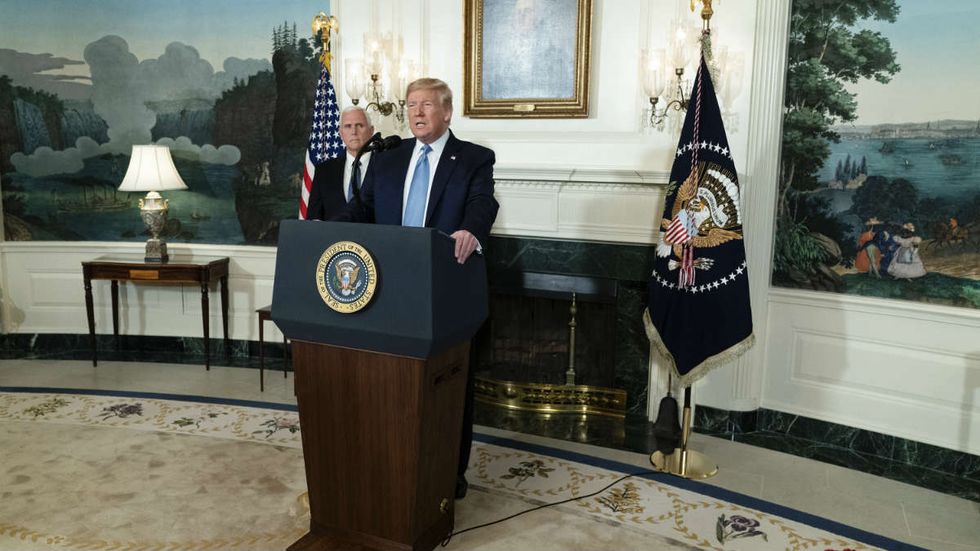
© 2024 Blaze Media LLC. All rights reserved.
President Trump calls for 'red flag' gun confiscation laws in response to Texas & Ohio shootings
August 05, 2019
Following two mass killings in Texas and Ohio over the weekend, President Donald Trump called for gun control in a statement from the White House Monday morning, in the form of expanded background checks and "red flag" gun confiscation laws.
"The first lady and I join all Americans in praying and grieving for the victims, their families, and the survivors," Trump said near the beginning of his address. "We will stand by their side forever. We will never forget. These barbaric slaughters are an assault upon our communities, an attack upon our nation, and a crime against all of humanity."
The president also unequivocally denounced the racist ideology that appears to have motivated the El Paso suspect.
"The shooter in El Paso posted a manifesto online consumed by racist hate," Trump noted. "In one voice, our nation must condemn racism, bigotry, and white supremacy. These sinister ideologies must be defeated. Hate has no place in America. Hatred warps the mind, ravages the heart, and devours the soul."
In discussing how to respond on a policy level later in the address, the president voiced his support for so-called "red flag" laws, which empower judges to take people's guns away by court order if the person is deemed to be a "grave risk to public safety."
"We must make sure that those judged to pose a grave risk to public safety do not have access to firearms and that if they do, those firearms can be taken through rapid due process," Trump said. "That is why I have called for red flag laws, also known as extreme risk protection orders."
While the impulse to keep guns out of the hands of dangerous people is an understandable one, the devil is always in the details. Not all so-called "red flag" laws are created equal, and they can often be nightmares for due process rights.
Taking Second Amendment rights away from people for non-criminal reasons is already on the books. Someone who has been adjudicated “as a mental defective” or involuntarily committed to a mental institution can’t buy a gun.
But again, due process is key.
As Independent Institute Research Director Dave Kopel explained to Congress back in March, while some state laws stipulate that only law enforcement can bring a red flag petition to a judge, newer versions allow petitions to be brought by “spurned dating partners or relationships from long ago.”
Another problem with some so-called red flag laws is that they allow confiscation orders to be issued ex parte, meaning that they can be issued when a judge only hears one side of the story and the target of the petition is not permitted to defend himself.
In addition to the confiscation laws, the president also called for other "real bipartisan solutions" in response to the shootings, which include reforms to America's mental health care system to "better identify mentally disturbed individuals who may commit acts of violence" for treatment and "when necessary, involuntary confinement."
He also voiced support for legislation ensuring that mass shooters would get the death penalty "and that this capital punishment be delivered quickly, decisively, and without years of needless delay."
Trump's full remarks can be found here.
#mc_embed_signup{background:#fff; clear:left; font:14px}
/* Add your own MailChimp form style overrides in your site stylesheet or in this style block.
We recommend moving this block and the preceding CSS link to the HEAD of your HTML file. */
Want to leave a tip?
We answer to you. Help keep our content free of advertisers and big tech censorship by leaving a tip today.
Want to join the conversation?
Already a subscriber?
Nate Madden
Nate is a former Congressional Correspondent at Blaze Media. Follow him on Twitter @NateOnTheHill.
more stories
Sign up for the Blaze newsletter
By signing up, you agree to our Privacy Policy and Terms of Use, and agree to receive content that may sometimes include advertisements. You may opt out at any time.
© 2024 Blaze Media LLC. All rights reserved.
Get the stories that matter most delivered directly to your inbox.
By signing up, you agree to our Privacy Policy and Terms of Use, and agree to receive content that may sometimes include advertisements. You may opt out at any time.
